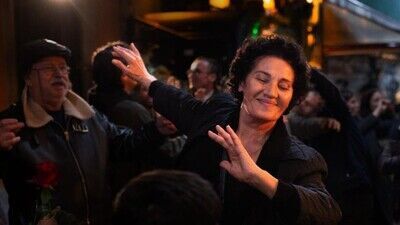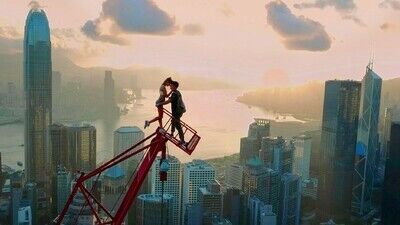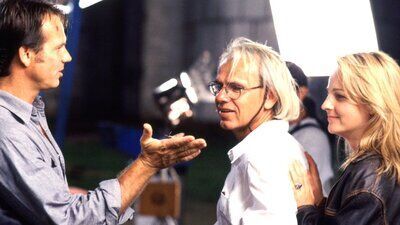It’s hard to say exactly which is the most frustrating aspect of Ben-Hur; the catalog of terrible decisions on display or the good choices all those bad ideas cover up. Quiet when it should be loud, loud when it should be quiet, the newest version of Lew Wallace’s epic novel gets the gist of the story but has no idea how to explain that gist to anyone else.
The basic building blocks are there, starting with Judah Ben-Hur (Huston) himself, an honest but inattentive man who’s wealth and happiness have kept him silent about Roman oppression in 1st century Judea. It’s a choice which costs him when an assassination attempt under his roof sends him to the galleys as a slave and his family to fates unknown.
But this briefest version of the story ever brought to screen, trying to streamline a sprawling narrative and update it for a modern audience, makes baffling decisions about tone, particularly when its religious themes come (ham-handedly) into focus. The end result feels like a film made by someone who’s had the story briefly described for them – there’s a big chariot race and Jesus shows up from time to time – as opposed to study and care.
Not that there aren’t things to appreciate – the building blocks for a good story are still there – and God knows Wallace’s plot could do with some trimming. It’s overly simplifying to say Ben-Hur is all about the chariot race, but it does make for the most organic climax as opposed to the book where it takes place at approximately the halfway mark (an issue the other film adaptations have struggled with).
Making the race THE point of the film places the icons of the opposing plot elements – Jewish convict Judah and his adoptive brother and Roman overlord Messala (Kebbel) – in direct physical conflict with one another. It’s particularly helpful to Messala, who screenwriters Keith Clarke and John Ridley have built more layers to, making him far more sympathetic and the drama of the race far more acute.
Kebbell, one of Hollywood’s current go-to screen villains, takes great advantage of those choices, from Messala’s angst over his family name to his conflicted love for Ben-Hur’s sister (Black’Delia), turning in the best performance in the film.
It adds weight not just to Messala but to Ben-Hur as well as it is Messala’s choices which send Judah to the Roman galleys until a stroke of fortune lands him in the camp of an understanding gambler and chariot racer (Freeman). It should come as no surprise that, at a technical level, the Chariot race is the focus of the film as well and the greatest beneficiary of Bekmambetov’s kinetic style.
Cinematographer Oliver Wood, freed from dusty deserts or torch lit interiors, goes to town with a bright palette, freely mixing effects with real charioteering, all kept to an astounding but clear pace by editor Dody Dom. From the field of different racers to the traps on the course itself Ben-Hur astounds without copying its predecessors and for one shining second all the disparate parts of the film come together as the former friends race not just for their lives but for their souls.
The downside of all this egg-basketing is not just that the rest of the film pales in comparison to it but is actively made worse. With so much time and energy and resources poured into the race, there seems to be nothing left for the entire film which leads up to it.
Much of it is people in rooms or occasionally balconies talking about things happening elsewhere. The plot-turning sea battle in which Ben-Hur acquires his freedom happens mostly off screen, occasionally visible through portholes. There are occasionally evocative visual ideas like an oar captain continuing to beat his drum while on fire, but for the most part Bekmambetov has managed to make (again outside of the race itself) an impressively ugly film in spite of the talented crew, particularly whenever it goes in doors.
A desire to shoot with a great deal of torch and candle light for a seemingly natural look has instead produced something muddled and not just difficult to look at but difficult to see. More importantly, the visual misfires seem a side effect of Bekmambetov’ s lack of understanding of how to create tone or resolution which satisfies all that led into it.
Some condensing is required for a story of this size, especially when crammed into just two hours, but at a certain point it becomes ridiculous. Characters like Pilate and Iiderim begin to exist primarily to move the plot along and speak that way. Major plot and character elements are introduced haphazardly and are never well integrated, creating the feel of a story which is arbitrary – all it needs to do is get to the race and exactly how it manages that is beside the point.
No element is more glaring in this regard than the occasional appearances of Jesus (Santoro) which, rather than having thematic resonance, seem to come out of nowhere primarily to push towards a denouement which has not been earned. Bekmambetov himself seems to be aware of this as it is in those moments he cranks up the directors tools the most, particularly the sound design and coverage, just to remind us ‘this is really important, pay attention,’ which shouldn’t be necessary.
At some point, the material must speak for itself, but Bekmambetov seems unaware of this or more interested in other things. It would be tempting to chalk all of this up to a lack of vision, but it seems even worse is true, there was a vision and it was misguided and misaimed as Messala’s vengeance. Loud and mostly dull, Ben-Hur is mercifully brief, but none of that quite alleviates the bad taste of what could have been.
Read more at http://www.comingsoon.net/movies/reviews/758885-ben-hur-review#IrrfQPbgbbz6QKi8.99






Leave feedback about this